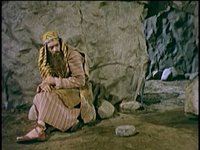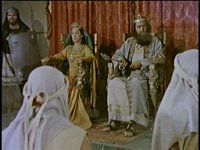 1953 was perhaps the year that more hokey Bible films got made than any other. Sure there was The Robe (although some would say that was evidence enough), but it also saw the release of Salome, Slaves of Babylon, Queen of Sheba and Sins of Jezebel. The Robe aside, it's immediately obvious that these other films revolve around an exotic leading lady. As is so typical of the genre, it's difficult to work out whether the film is really about sex or saintliness.
1953 was perhaps the year that more hokey Bible films got made than any other. Sure there was The Robe (although some would say that was evidence enough), but it also saw the release of Salome, Slaves of Babylon, Queen of Sheba and Sins of Jezebel. The Robe aside, it's immediately obvious that these other films revolve around an exotic leading lady. As is so typical of the genre, it's difficult to work out whether the film is really about sex or saintliness.Anyone hoping that Sins of Jezebel was about the former rather than the latter will come away very much disappointed. The film never lives up to the tacky allure of its title. True, leading lady Paulette Goddard was the girl who had stolen Charlie Chaplin's heart, but that was twenty years before this film's release. By the time Jezebel was playing in cinemas the girl was now very much a middle aged woman whose career was fading rapidly.
For an actress who was so closely associated with Chaplin's iconic figure 'The Tramp', and co-star in his best known film, The Great Dictator, Jezebel marked a new low. Whilst she's supposedly at the centre of a love triangle, neither of her leading men look particularly interested. Furthermore, the film is so pious that Goddard has little more to do than deliver the cheesy dialogue in the hope that someone might notice her flutter her eyelids.
 The film itself seems like a halfway house between a Sunday school film and a DeMillean biblical epic. At times it seems like a lost episode of The Living Bible series: it's awfully preachy, features lamentably wooden acting and tea-towel grade costumes. Elijah marches on and his whole manner is reminiscent of that particular series' portrayals of Old Testament heroes.
The film itself seems like a halfway house between a Sunday school film and a DeMillean biblical epic. At times it seems like a lost episode of The Living Bible series: it's awfully preachy, features lamentably wooden acting and tea-towel grade costumes. Elijah marches on and his whole manner is reminiscent of that particular series' portrayals of Old Testament heroes.In other places, though, it borrows from Samson and Delilah. I've already mentioned the love triangle, but the extremes with which the plot goes to to make this happen and the way jealously becomes the motivating factor for the femme fatale's actions, which then spurs the plot on is straight out of the 1949 classic. There's much earnest grabbing of arms and starring deep into one another's eyes, and the nagging sense that even if the Bible didn't exist, substantially the same film could still have been made.
But there's also an interesting relationship between this film and a later DeMille film, which just seems a little too coincidental. The film opens with someone narrating the creation story from Genesis 1. As this progresses it becomes apparent that this opening shot is a close up on a painting, which the camera then pans across to illustrate the story. When the story has reached its climax the camera zooms out and a man in a suit and clerical robe steps into the frame to deliver a speech. He talks about the Ten Commandments, and Israel's idolatry, and as he does so he paces around, pausing momentarily by models of Moses's stone tablets or a model idol.
 Anyone familiar with DeMille's 1956 version of The Ten Commandments will recognise this sequence right away. That film starts with DeMille stepping out from behind a curtain to address the audience at length, and had initially been publicised by a ten minute trailer where DeMille strolled around his artefact-laden office.
Anyone familiar with DeMille's 1956 version of The Ten Commandments will recognise this sequence right away. That film starts with DeMille stepping out from behind a curtain to address the audience at length, and had initially been publicised by a ten minute trailer where DeMille strolled around his artefact-laden office.This character soon gives way to the opening credits which after a brief establishing shot of Ahab's palace moves inside to focus on an angry Elijah. The film is keen throughout to underline the link between these two preachers. Not only are they linked by this sequence either side of the credits, but also in the film's closing moments. There the modern day preacher announces that "there will always be the voice of an Elijah ... and when he is done he shall pass on his mantle to another". As he turns to leave he picks up a walking stick which bears an uncanny resemblance to Elijah's staff.
The portrayal of Elijah is somewhat bombastic. There is little of the biblical character's humanity that is so skilfully illustrated in Kings. Indeed the entire sequence where he prays for his own death before hearing God speak afresh has been chopped. All this Elijah really does is stride on and off screen chastising his countrymen. It's hardly a surprise, then, that the film comes off like St. Paul's clanging bell - a one note production that is shiny on the outside but empty on the inside - it's as devoid of subtlety and comprehension of it's audience as its hero.
 The film's other main hero is Jehu, and by contrast his character's narrative arc is more interesting. Initially close to Ahab, he turns his back on his pious girlfriend for Jezebel, only to rebel against both her and Ahab towards the end of the film, and take a band of followers into the mountains. There, Jehu is anointed (by Elijah not Elisha as Kings has it), and returns to capture the city.
The film's other main hero is Jehu, and by contrast his character's narrative arc is more interesting. Initially close to Ahab, he turns his back on his pious girlfriend for Jezebel, only to rebel against both her and Ahab towards the end of the film, and take a band of followers into the mountains. There, Jehu is anointed (by Elijah not Elisha as Kings has it), and returns to capture the city.There are a handful of changes to the biblical narrative. Chief amongst them is Elijah's conflict with the prophets of Baal on Mount Carmel, where the contest is ultimately about who can make it rain, rather than who can bring down fire from heaven. It also conflates Obadiah and Naboth which works well and gives the film it's most interesting character.
Overall, though, this is the only feature length version of this story that is available on DVD, and whilst it's not particularly well done, it's noteworthy for its apparent influence on DeMille's 1956 version of The Ten Commandments. There's a scene guide below. As there's a lot that extra-biblical so it's not that long.

Creation & Preacher's intro - (Gen 1 & 2)
Ahab prepares to marry Jezebel - (1 Kings 16:31)
[Extra-Biblical Episode]
[Extra-Biblical Episode] - Ahab and Jezebel marry
Ahab builds Jezebel's temple - (1 Kings 16:32)
Elijah predicts a drought - (1 Kings 17:1)
[Extra-Biblical Episode]
Contest on Mount Carmel - (1 Kings 18:16-40)
[Extra-Biblical Episode]
"Naboth" confronts Jehu - (1 Kings 18:13)
[Extra-Biblical Episode]
Naboth tried and killed - (1 kings 21:1-16)
[Extra-Biblical Episode]
[Extra-Biblical Episode]
Elijah confronts Ahab - (1 Kings 21:17-24)
Death of Ahab - (1 Kings 22:29-38)
Jehu Anointed - (2 Kings 9:1-13)
Jehu kils Jezebel - (2 Kings 9:30-37)
[Extra-Biblical Episode]













